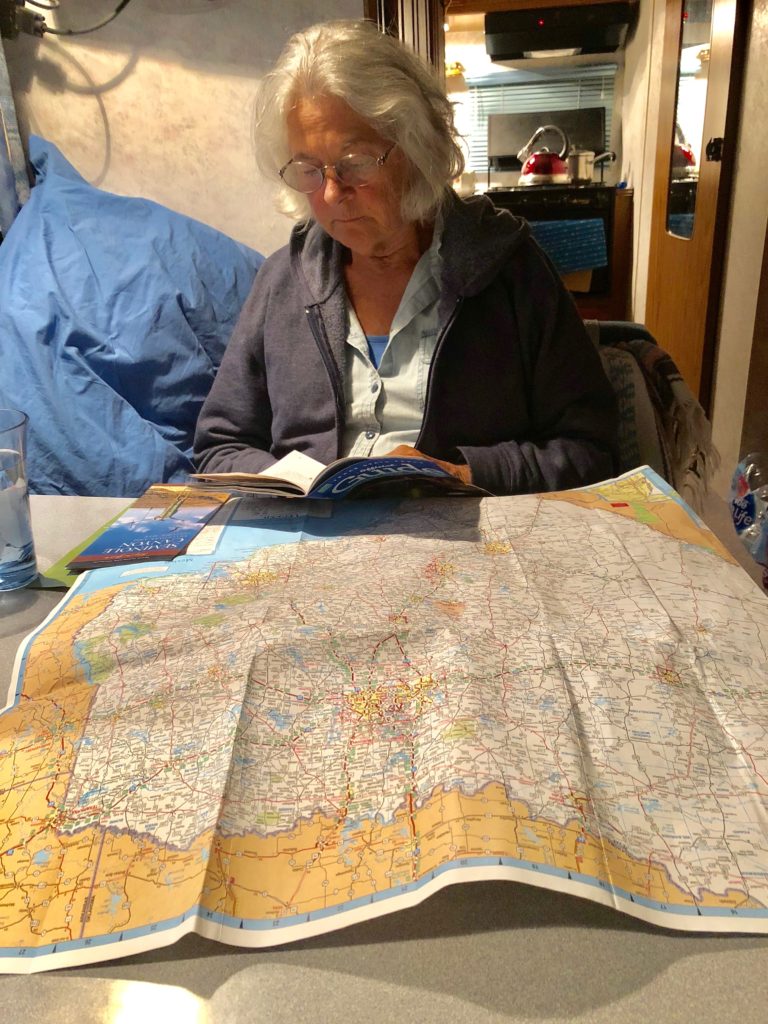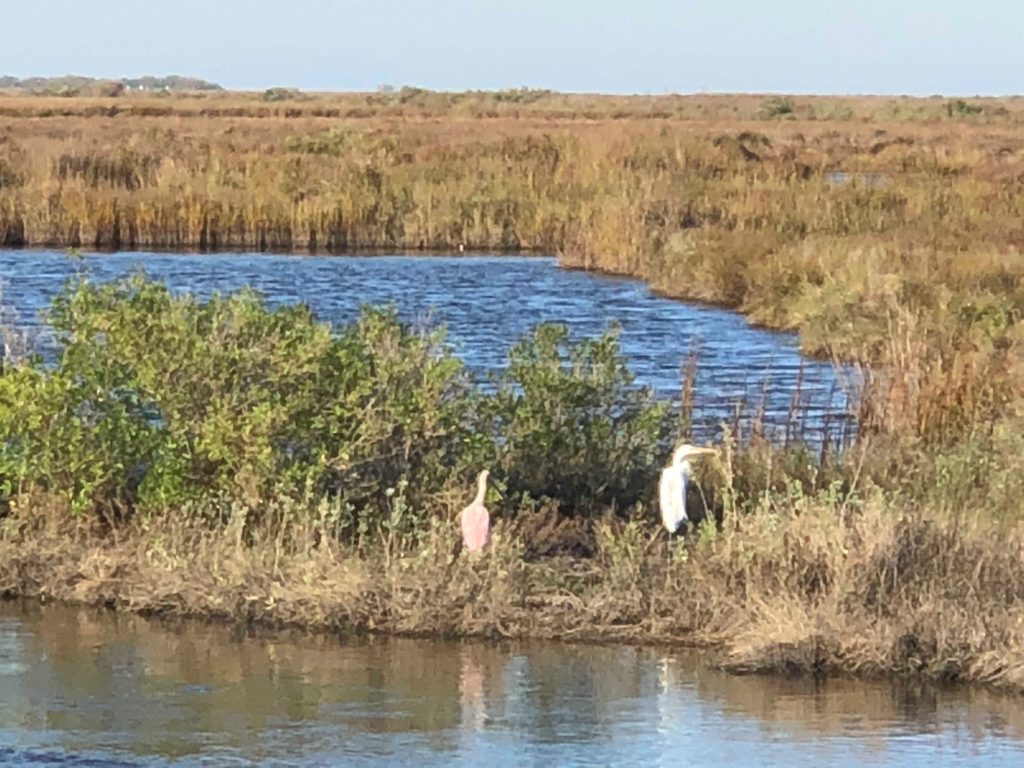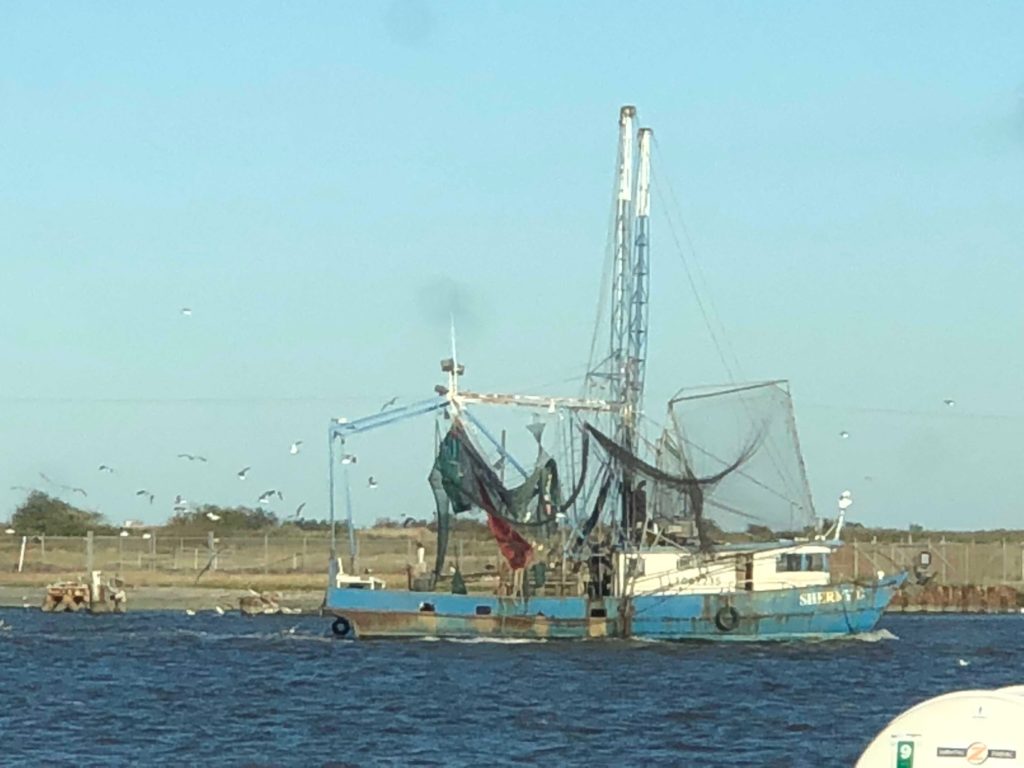We start toward Corpus Christi along Route 90 through vast plains of tumbleweed that has not yet tumbled.
It’s Thanksgiving tomorrow so Felicity has been working hard to book campsites. The ones in State Parks are best for people like us who enjoy nature but it’s not easy to book them. She found a good site for tomorrow that is full today and eventually a private one near it with a space today. The one we were aiming for in Corpus Christi is closed for repairs following a hurricane. She’ll find an alternative when we’re closer.

The future tumbleweed is soon replaced by brush, some of it 10-12 feet high. There are a very few grass-covered fields. Most of the fencing looks sturdy so I assume there are more cattle than we can see. It’s only occasionally that one or two can be glimpsed among bushes next to the road.
Entrances to the ranches are far apart, so they really are big. I wonder about their economics. How much income can you generate from a few cows scrounging scraps of brown grass from between densely packed bushes? These don’t look like commercial businesses.
A couple of hours from Seminole there are a few large irrigated fields. Why here? Why not in other parts of this huge plain? Three hours out we start to see oil pumpjacks.
It’s been overcast all day and I had to use the wipers a few times to clear tiny droplets from the windshield. We didn’t really get moving until after lunch because the supermarket stop was long but it’s only a four hour drive so we’re at tonight’s campsite before dark.
Next day – Felicity cooks egg, bacon and portobello mushrooms. I could feel sorry for myself because I can’t partake but how silly that would be. Instead, I can enjoy her pleasure and relish the aroma. What a blessing to be alive. And now the sun has come out!
The morning is taken up by breakfast and a shower. It feels good. Then we move to the Choke Canyon State Park campsite where I read more of the Indigenous People’s History, a detailed account of genocide carried out by Federal and State governments and settlers alike. How did they justify it? They said the Indians are savages. But why is it okay to kill savages?
It was legitimized by the Doctrine of Discovery giving European nations title to any land they “discovered”. That started with a 1455 papal bull authorizing the Portuguese monarchy to seize West Africa. Two years after Columbus “discovered” America, the Spanish monarchy sponsored a 1494 papal bull that divided all non-Christian lands between Portugal and Spain. Other European monarchs relied on the Doctrine of Discovery to build their colonial empires and in 1792 Secretary of State Jefferson claimed it also for the infant USA.
Those beliefs that our predecessors brought from Europe live on in our sense of entitlement today. That’s why we imagine it’s OK for us to be conducting what we call counter-terror activities in 76 countries, close to 40% of all the world’s nations, directly contributing to the deaths of 500,000 people since 2001.
Our karma is far from unique. It’s just that we have more money than anyone else right now and, therefore, our leaders have more scope for greed, indifference and hatred. I’ll continue to do all I can to motivate the opposite behavior.
We go for a walk round the campsite. My legs feel quite weak today. Balance is not a problem, I’d just feel better sitting down. After a rest I read more of Ralph Peter’s “Flames of Heaven”. His protagonists are vividly human, more so than most of us but completely convincing. He’s not a very likable man but he sure can write.
Felicity has a fine feast of cheeses, guacamole that she says is the best she has ever made, tamales and black refried beans. We share some Prosecco.
Next day – I slept well. My nostrils didn’t get plugged for the first time in several days. The air is not so dry here by the lake. Also, we didn’t need the central heating so it wasn’t blowing dust around.
We start south and soon pass the Brush Country Cowboy Church. In fact, the brush has almost all been eradicated. We’re driving through grassland.
There must be quite a bit of oil from the pumpjacks around here. There are some large oil processing plants. A little further on we’re in a region of very large plowed crop fields. No need for irrigation here. The air is even starting to feel humid.
Now we’re in the midst of used car lots and huge stores. It’s Black Friday so the roads are filled with people eager to shop. Back in the small towns with BBQ, taco and suchlike restaurants and bait/ammo/beer stores, towns where every guy must have a bigass pickup truck, I felt like a foreigner. Here I’m utterly out of place, an alien.
Now we’re over the bridge and onto Padre Island. A little further on we’re away from civilization in the National Park. The almost flat dunes shimmer, long grass blowing in the wind. The campsite next to the beach is already almost full just after midday but we find a good spot, open the windows and let the breeze have its way with us.
If I can still walk next summer I’d like to visit Utah and Northern New Mexico.
Next Day – I slept well and long. The humidity is very helpful. My nose feels clear. We’ll have a day of rest today. Felicity will paint and I will read. We’ll both enjoy the sun, the clean air and the masses of yellow flowers.
A man starts walking down the road, a dog begins to follow. A woman calls, the dog stops, the man turns and speaks, the woman calls again, and the dog turns toward her. It scratches itself then trots back to her. We aren’t surprised when dogs understand us.
We also aren’t surprised that we can walk. The woman’s walk is more fluid than the man’s but how amazing it is that either of them can walk at all. We only fail to be astonished because we keep seeing it happening.
Being unable to speak is inconvenient and I can no longer enjoy the variety and tastiness of foods but I do notice and reflect more now. That’s the purpose of silent spiritual retreats. This is different from a retreat in that everyone else is doing what people normally do but the experience Is fundamentally similar for me. I’m not so distracted by my own participation in what goes on.
David commented: You say: “Being unable to speak is inconvenient … but I do notice and reflect more now”. It seems to me that “notice” and “reflect” are quite different, and “participation in what goes on” can be a form of noticing; it doesn’t require contributing verbally or otherwise. Reflecting seems after the fact/experience. Do you find that not being distracted by planning what to say gives you space to more closely/intensely feel/experience/perceive what’s around you and happening in the moment? Do you have more to reflect on later?
I replied: Yes, I do notice more. As you say, I’m not so preoccupied with thinking about how to interact with others so I have more opportunity for awareness. I’ve mentioned the Zen abbot who inspired me. On a Zen retreat you get a brief one-on-one opportunity to ask the teacher a question. When I sat before him his eyes were very wide open. He seemed hyper alert, his entire focus on what I would say and how I would say it, none of his ego present. His attention was entirely on me. And his answer was utterly convincing. I also have the opportunity to begin reflecting right away on what I noticed, either “outside” or “inside” my head. I was going to say I’m less aware while I’m reflecting but that’s not accurate. I’m more relaxed about reflecting because I have more time to do it and that means I can turn away from it immediately I detect some interesting new input.
Next day – We bypass Corpus Christi and head east along Route 35 beside the Gulf. The land here is densely covered with live oaks. Then comes swamp land that goes on and on and on until it’s followed by cropland that does the same. There’s a lot of standing water.
It feels as though a few more years of global warming to make the polar ice caps keep melting will result in this whole area becoming seabed. The ocean won’t have to rise far. Increasingly savage storms will do the rest.
As we get further inland we pass through a mix of cropland and cattle pasture. Both look healthier than the land closer to the Gulf but there’s still quite a lot of standing water. It’s very flat. “Why would anyone choose to live here?” Felicity asks.
We stop at a supermarket for drinking water, beer, Ensure and other stuff. I brought plenty of formula but we’ve been on the road a long time and now there’s only 17 days worth left so I need to supplement it.
The drive round the outskirts of Houston is much the same as driving round any city. So many car lots. It doesn’t feel surprising that there are all these restaurants, everyone has to eat, or all the stores, but who buys all these cars?
We stop at a campsite at Anahuac on the Galveston Bay. There’s a sign warning campers not to let their dogs go swimming because there are alligators but it doesn’t say anything about children. I hope we can see an alligator in the morning.
Next day – No alligator with intact sensory apparatus will come out this morning. The wind is still powerfully cold. Last night it lifted the hatches and made them howl as the camper shook from side to side.
There are so many pelicans here along with egrets, white and blue herons, and cormorants.

The land through which we pass on Routes 65 and 73 is almost all cattle pasture. Every so often we pass a gas processing plant. As we approach Port Arthur there are huge steaming refineries. Then we turn onto Route 82 to continue along the coast into Louisiana.
The only structure for quite a while is a medical waste facility miles from anywhere and suspiciously close to a river. The land here is a mixture of cattle pastures and swamp, all very flat. Presumably it’s wetter than usual; the cattle on some pastures are squelching through standing water.
In some places the road is right on the oceanside. In the distance out to sea are oil rigs. Most of the time the road is just a little inland. Now we begin to see houses. Most are on stilts and those that aren’t are on artificial islands. Here’s a church on stilts. Now there’s a school on them. Quite a few of the houses are trailer homes.
We pass through a small town. The only building beside the road that isn’t on stilts is the library, which is quite small.
There are many herons, both gray and white. Suddenly, Felicity exclaims! She’s seen a pink flamingo. I stop and back up. It doesn’t look pink to me but I’m red green colorblind. She consults her bird book. It can’t be a pink flamingo after all because they don’t come here. It’s a roseate spoonbill.
We drive on to the ferry at Cameron. Very cool. Felicity takes pictures of shrimp boats.

Quite a way further on an almost black wild pig on the opposite verge begins to run. I stop as quickly as I can from 50 mph but even so I outrun him. He scampers across the road behind us and disappears in the rushes.
It’s dark by the time we camp at Palmetto Island State Park, Louisiana after another great day.

Martin
This was my favorite post. Your writing is beginning to more resemble Zen and the Art of Motorcycle Maintenance, in the sense that you are getting down the awareness of being in the moment, drifting from scenery to justice and to your physical condition in an increasingly blended way. Bravo. You are inspiring me.